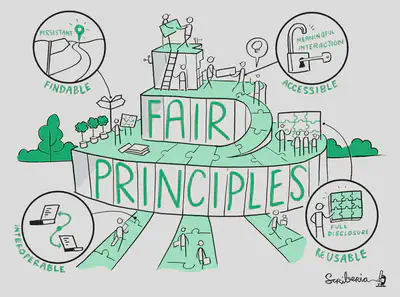The FAIR Phytoliths Project

目录
What the project is about
Increasing the FAIRness of phytolith data
Phytoliths are plant microfossils used world-wide to address a variety of questions in a variety of fields like archaeology, palaeoecology and palaeontology. Diverse laboratory procedures, analyses and identification criteria are used resulting from different research traditions. Some steps, such as the normalisation of nomenclature through the International Phytolith Society (IPS), have been promoted to standardise phytolith analysis and the subsequent publication of data. However, the standardisation of phytolith research and data publication is still far from being achieved. A recent assessment of the data sharing practices within the phytolith community (Karoune 2022) found that only about half of the publications share some form of data and the majority do not provide reusable data.
FAIR Phytoliths has grown from initial efforts by Emma Karoune to raise awareness of issues with poor data sharing practice. This initiative is supported by the International Phytolith Society on data sharing and represents the first steps towards the FAIRification of phytolith data: an evaluation of sharing practices in phytolith research; the creation of a GitHub repository for collaborative use by this working group and the initiation of the FAIRification project; and the development of a webpage to provide the community with information as the project proceeds.
What do we want to do?
The outcomes expected from this project are:
- Promoting the use of GitHub as a collaborative workspace.
- Conduct a FAIR assessment of phytolith sharing data using two regional studies: Europe and South America.
- Gather information about data sharing practices, expectations and predisposition within the phytolith community via a survey.
- Create a protocol/guidelines for phytolith (raw) data publication and sharing.
The project is organised in three work packages:
1. FAIR assessment of existing data.
Published phytolith datasets from South America and Europe will be assessed to establish the breadth of phytolith data (including archaeological, palaeoecological and modern botanical studies). This will initially be from articles published between 2016 to 2020, but earlier data will be collected if needed to reach data saturation (Saunders et al. 2017). These two regions have been selected because different phytolith “traditions” exist among researchers working in Europe and South America. Most European phytolith studies use the standardised nomenclature (ICPN 1.0), whereas South American researchers have developed their own naming criteria. In spite of this, the overall principle of the methods used for processing phytolith samples is the same (the separation of phytoliths from other particles in sediments or modern plants), as well as the research questions addressed and the types of data analysis that is conducted on primary phytolith data, thus ensuring the comparability of the datasets. The FAIR assessment will be conducted by establishing a subject-specific FAIR assessment tool, similar to the FAIR enough? checklist, using a Google Form to standardise data collection.
2. Community building.
A survey will be sent out to our research community to gain insight into how researchers see their own data sharing practice. This will gather information about current data sharing practices and opinions on why more open practices are not used. This survey will give the option to the authors of the existing datasets to make their data open access. This also gives us the opportunity to work with researchers to improve these datasets in terms of their FAIRness. This could take the same approach as the “Bring your own data workshop” at the University of Cambridge that aimed to improve data management through training. These improved datasets will then be used as case studies to raise awareness of the need for planning data management and provide resources for more training in our community. Training our community in open science skills, such as GitHub, will help to aid accessibility to open science tools in general but also help to advance the implementation of future FAIR data criteria.
3. Development of guidelines for existing datasets and future FAIR phytolith data.
The FAIR assessment of existing practices and datasets will be used to propose criteria for minimum information requirements for data sharing and potential areas of reuse that consider the limitations of using these data. These constraints will be used to suggest best practice criteria for the implementation of future FAIR phytolith data.
Find out more
Please visit our website or Github repository for more information.
Part of project
FAIR principles
Find out about what the FAIR data principles are and why they are important for phytolith research.
Meet the team members
Marco MadellaFunding
This project has received funding from the European Union’s Horizon 2020 research and innovation programme under grant agreement No 824087.